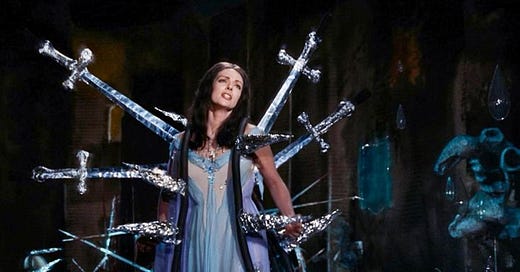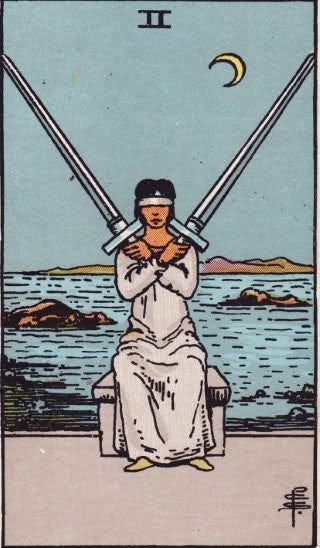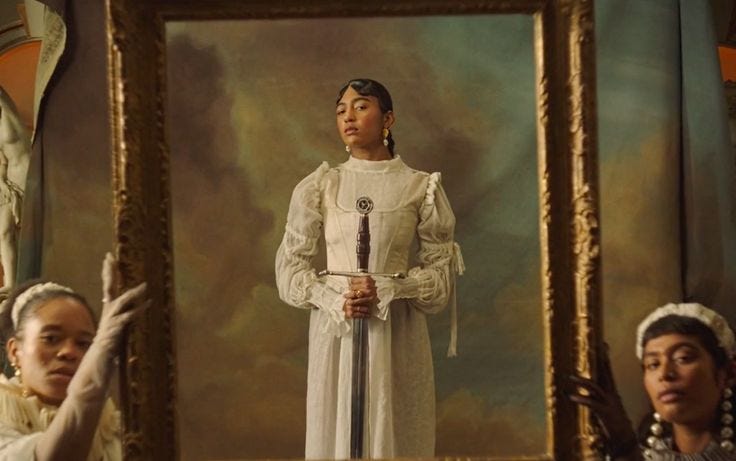Tarot symbolism: Swords and self-actualisation
Swords - Air - Aquarius, Libra, Gemini - Thinking Type
A shapeshifting magician Merlin announced that only the True King can pull the sword Excalibur from the stone. After many noblemen attempt Merlin’s challenge without success, a teenage boy named Arthur, unaware of the contest, pulls the sword out with ease.
Excalibur (1981)
We can see the act of pulling the sword from the stone as self-actualisation–taking the action necessary to become the person you were meant to be. Learning from the Arthurian tale, it seems it should happen relatively simple. For anyone “doing the work”, the idea that it is easy is laughable. It’s a painstakingly slow and terrifying process that is monotonous at the best of times because it requires consistent effort. At our women's circle the other week, we spoke of the exhaustion that comes with working on yourself for years and years. It can be even more frustrating when other people around us seem to be doing nothing to help themselves and cause other people problems in the process.
I think about the noblemen at least attempted to pull the sword. I wonder how many others there were who stared at the hilt sticking out of red marble and thought of trying, but decided not to bother or to not embarrass themselves. I think of the others who saw the sword and recoiled at the idea of that kind of responsibility.
Sword as symbol
A sword requires a skilled master to craft and a trained swordsman to wield to be used effectively. A sword's purpose is to divide, and how well it is used depends on the union of body and mind. In Japan, crafting a samurai sword was a ceremonial process where the swordsmith would purify himself before entering a kind of religious flow state to craft the perfect sword. Wielding a sword correctly is a heavy responsibility.
In tarot, the Swords center around the mind, logic and intellect. Swords in a reading reflect the quality of thoughts and beliefs. The suit of swords represents the balance between intellect and power, often Sword cards act as a warning. It also deals with the constructive and destructive nature of taking action.
A sword represents psychic power. When the power (thinking) is negative, it is confused, unfocused and dangerous in a chaotic way. Unfocused thinking loves comparison, manifesting as jealousy, and may cause arrogance, egotism, cruelty and violence. When positive, thinking is focused and directed. Positive thinking promotes self-efficacy and acting with intention. Things unfold easily, answers come naturally, and results occur without force or difficulty. Positive thinking does not mean spiritual bypassing, “toxic positivity,” or avoiding darkness. To think positively is to allow the voice of encouragement and resilience to speak to you.
Bluebeard's Castle (1963)
Thought distortions
I’ve been thinking recently about the effect of the stories we tell ourselves. I struggle endlessly with a vitriolic inner critic and I’ve attempted a lot of mindfulness techniques to quieten the voice, accept the voice and soothe it. But it flairs up, especially the week before my period. Concurrently, I’ve been noticing the way I talk about myself to people. I love a bit of self-deprecating humour and I talk myself down a lot. I’ve realised how I assume myself to be less intelligent or capable than I am, and I think that other people think that I am stupid. I wonder how much of this is social conditioning of my gender, dumbing myself down or being forced to be overtly humble (a trait I find excruciating). My masters degree is challenging my belief that I’m not smart and not good at school.
I’ve been learning about cognitive distortions which are unhelpful thinking patterns that have solidified over years of telling yourself the same things over and over. Perhaps you were told you were not good at art in high school, and now you think you can never be an artist. Cognitive distortions show up in black-and-white thinking, catastrophising, overgeneralising, talking in shoulds (what you should do, think, say), and assuming you know the future or what other people are thinking.
Affirmations, as cringe as they are, are a worthy opponent of cognitive distortions. Repeating awkward statements to yourself in the mirror is not for the faint-hearted. I’ve found the most effective way to combat cognitive distortions is to write them down and then write down the opposite statement next to it, which transforms into a compliment you’ve always wanted to hear. I’ve made more of an effort to not constantly hang shit on myself both out loud and in my head. I’ve tried to sell myself a little more in conversation and tell people the good stuff I’m doing. Another belief I’m challenging is that there is heroism in suffering and that I am more comfortable with myself when I’m struggling. I’ve been asking myself: who am I without my “story”? Who am I without my pain?
Hope Tala - Cherries
The prophecy
Merlin had engineered Arthur’s birth and, most likely, placed an enchantment on the stone so that only he could pull it out. After Arthur pulled the sword the first time, he had to do it again and again to prove himself to everyone else. The other noblemen tried as well, they still couldn’t. Only then was Arthur considered the True King.
We are the stories we tell ourselves. We are both the prophecy maker and the prophecy. Challenging your thought distortions is a relatively simple task, but it can lead to immediate profound changes.
An episode of the Maisie Hill podcast I listened to recently had a real impact on me:
What would you want if it could come easily?
What would happen if you believed you could have what you want?
How could you make it happen in a small way today?
Source:
The Book of Symbols: Reflections on Archetypal Images by Taschen
The Ultimate Guide to Tarot Card Meanings by Brigit Esselmont
Discovering Yourself Through Tarot by Rose Gwain
The Mental Health and Wellbeing Workout for Teens: Skills and Exercises from ACT and CBT for Healthy Thinking by Paula Nagel
Excalibur on Wikipedia











